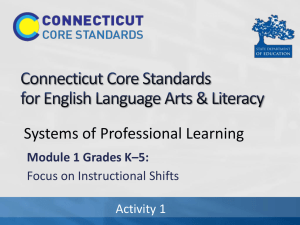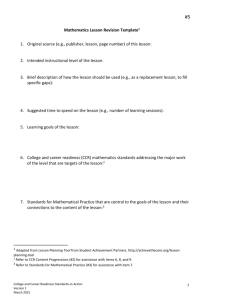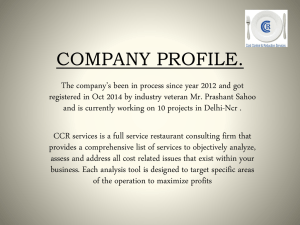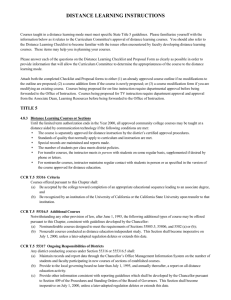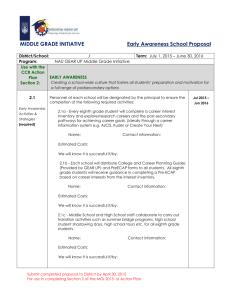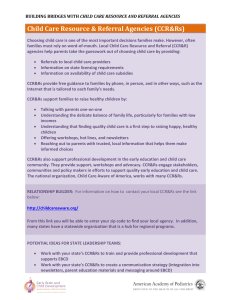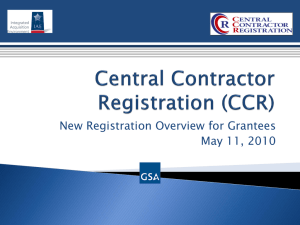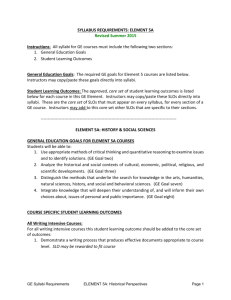CCR Course Unit #1 - National Council for Community and
advertisement
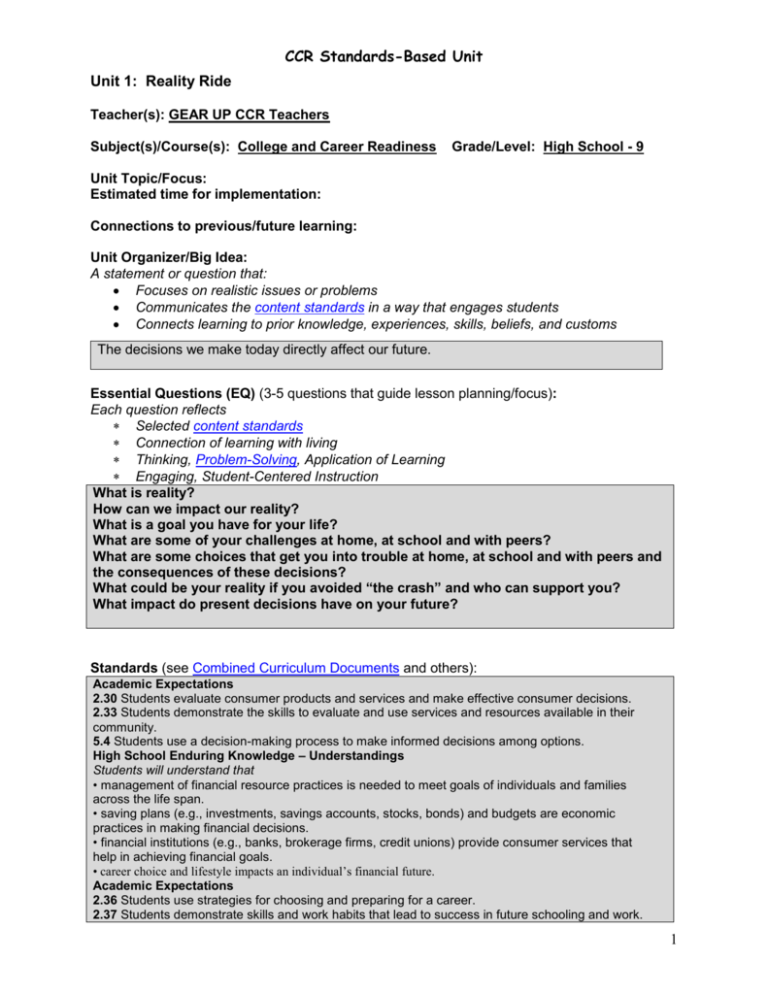
CCR Standards-Based Unit Unit 1: Reality Ride Teacher(s): GEAR UP CCR Teachers Subject(s)/Course(s): College and Career Readiness Grade/Level: High School - 9 Unit Topic/Focus: Estimated time for implementation: Connections to previous/future learning: Unit Organizer/Big Idea: A statement or question that: Focuses on realistic issues or problems Communicates the content standards in a way that engages students Connects learning to prior knowledge, experiences, skills, beliefs, and customs The decisions we make today directly affect our future. Essential Questions (EQ) (3-5 questions that guide lesson planning/focus): Each question reflects Selected content standards Connection of learning with living Thinking, Problem-Solving, Application of Learning Engaging, Student-Centered Instruction What is reality? How can we impact our reality? What is a goal you have for your life? What are some of your challenges at home, at school and with peers? What are some choices that get you into trouble at home, at school and with peers and the consequences of these decisions? What could be your reality if you avoided “the crash” and who can support you? What impact do present decisions have on your future? Standards (see Combined Curriculum Documents and others): Academic Expectations 2.30 Students evaluate consumer products and services and make effective consumer decisions. 2.33 Students demonstrate the skills to evaluate and use services and resources available in their community. 5.4 Students use a decision-making process to make informed decisions among options. High School Enduring Knowledge – Understandings Students will understand that • management of financial resource practices is needed to meet goals of individuals and families across the life span. • saving plans (e.g., investments, savings accounts, stocks, bonds) and budgets are economic practices in making financial decisions. • financial institutions (e.g., banks, brokerage firms, credit unions) provide consumer services that help in achieving financial goals. • career choice and lifestyle impacts an individual’s financial future. Academic Expectations 2.36 Students use strategies for choosing and preparing for a career. 2.37 Students demonstrate skills and work habits that lead to success in future schooling and work. 1 CCR Standards-Based Unit 5.4 Students use a decision-making process to make informed decision among options. High School Enduring Knowledge – Understandings Students will understand that • career choices impact life-long earning potential, career opportunities and job satisfaction. • jobs/careers reflect both individual and societal needs and vary within communities and regions. • resources are available in planning for an occupation in a career cluster. • academic and technical skills in a variety of jobs are transferable and have commonalities. • the transition process is continuous and focuses on post school outcomes. • life-long learning in a global society is important for personal and professional growth. High School Skills and Concepts Students will • analyze and evaluate why people need to work and how a person’s career choice impacts life long earning potential, career opportunities, and job satisfaction • explain how jobs/careers reflect both individual and societal needs by: o comparing and contrasting the many factors (e.g., family, environment, location) that must be considered when selecting and preparing for employment or a career path • analyze the direct relationship of academic/technical skills, extracurricular activities, and community experiences to career preparation by: o researching career choice through the use of technology o evaluating job and career opportunities (e.g., veterinarian, sales associate, interior designer, meteorologist, physical therapist) in career clusters (e.g., Agriculture, Arts & Humanities, Business & Marketing, Communications, Construction, Education, Health Science, Human Services, Information Technology, Manufacturing, Public Services, Science & Mathematics, Social Sciences, Transportation) that vary within and among communities and regions • create an educational plan that can impact their future career opportunities by: o accessing and evaluating resources for locating job/career information career paths related to interests, aptitude (e.g., academic skills), and abilities • analyze how the changing roles of individuals and the workplace relate to the new opportunities for careers in a global society • analyze how life-long learning in a global society is important for personal and professional growth 2.37 Students demonstrate skills and work habits that lead to success in future schooling and work. High School Enduring Knowledge – Understandings Students will understand that • interpersonal skills impact individual’s career choice and success in the workplace. • employability skills are important to achieve success in the workplace. • academic and technical skills prepare them for obtaining, maintaining, advancing and changing employment. • team skills are essential in achieving success in the workplace GEAR UP CCR Course Expectations: Describe how this unit will address each of the GEAR UP Course Expectations. GEAR UP Students in CCR course demonstrate academic improvement. 1. Students will demonstrate Academic Behaviors. a. Checking grades regularly b. Turning in all assignments c. Organizing self and materials d. Note-taking e. Study skills f. Test taking strategies 2. Students will exhibit work readiness skills a. Attendance b. Participation 2 CCR Standards-Based Unit c. d. e. f. g. h. Communication/presentation skills Teamwork Positive attitude Growth mindset Collaboration Critical thinking GEAR UP Students develop educational resilience strategies. Educational Resilience: 1. Students will demonstrate ability to set and monitor personal goals. 2. Students will explain the impact that present decisions have on their future. GEAR UP CCR courses prepare students to be college and career ready. College & Career Ready/College Pathways 1. Students will investigate and compare the career pathways available. 3. Students will explain how KEES money is earned. CCR teachers and other GEAR UP staff collaborate to ensure expectations for CFES Core Practices are met (Mentoring, Leadership through Service, Pathways to College). Students Will Know (SWK) and Students Will Do (SWD): Identified content within the unit of what students will know and be able to do by the end of the unit. Students will know… Lesson 1 What is reality? What is a goal you have for your life? Lesson 2 What are some of your challenges at home, at school and with peers? What are some choices that get you into trouble at home, at school and with peers and the consequences of these decisions? Students will do…(can be used as formative assessments) Lesson 1 Bell ringer: Journal: What were your biggest fears of starting high school? Intro: Emotional Rollercoaster Video and Discussion Activity: Visual Analogy points 1 & 2 Exit Slip: Goal Set-Goal Met Wall Lesson 2 Bell ringer: Why is it important to have personal goals? Intro: Review Visual Analogy Activity: Continue points 3, 4, 5 and 6 Activity: Count Your Fingers or $20 Decision Exit Slip: What are some choices that get you into trouble at home, at school and with peers and the consequences of these decisions? 3 CCR Standards-Based Unit Lesson 3 How can we impact our reality? What could be your reality if you avoided “the crash” and who can support you? Lesson 3 Bell Ringer: Play appropriate song and have students respond in writing. Ex: Unwritten, Natasha Bedingfield, The Climb, Miley Cyrus. Intro: Review Visual Analogy Activity: Continue Points 7, 8 and 9 Activity: Staying on Track Formative Assessment: Completed Visual Analogy Lesson 4 What impact do present decisions have on your future? Lesson 4 Bell ringer: Read and sign The No “F” Game Plan Intro: Connect No “F” Game Plan to KEES money. Activity: KEES $ Activity Transition to Pathways – Discuss pathways offered at each school – Invite Guidance Summative Assessment Writing Activity: 1-2 pages “What is your reality?” 10-15 minutes of Friday to finish. May work on as homework. Lesson 5 What impact do present decisions have on your future? Lesson 5 Bell ringer: Continue writing activity Intro: Everfi Financial Literacy Activity: Savings module Exit: Share out What is my reality? Student Friendly Learning Target(s): Lesson 1. I can define reality. Lesson 2. I can identify challenges. Lesson 3. I can make wise decisions. Lesson 4. I can understand the consequences of my choices. Lesson 5. I can change my reality. Connections to Literacy: Literacy includes, reading, writing, and the creative and analytical acts involved in producing and comprehending text. Journal Activities What is My Reality Essay Reading – The No “F” Game Plan Everfi Financial Literacy Module Connections to Career/Workplace: These are the skills necessary for a successful transition to postsecondary education or work and a desire for life-long learning in a global society. Focus for CCR Course is 21st Century Skills. Creativity and Innovation Critical Thinking and Problem Solving Communication and Collaboration Flexibility and Adaptability 4 CCR Standards-Based Unit Initiative and Self-Direction Social and Cross-Cultural Skills Productivity and Accountability Leadership and Responsibility End of Unit Assessment: A product or performance that: Allows learner to demonstrate their knowledge of targeted content standards through a variety of formats (Universal Design). Offers choice to meet learners differentiated needs. Directs the development of instructional strategies and activities. Includes scoring guide/rubric to inform learners of expectations. Summative Assessment Writing Activity: 1-2 pages “What is your reality?” 10-15 minutes of Friday to finish. May work on as homework. My Reality Ride Write a 1-2 page personal essay titled "My Reality Ride". Discuss what it's like to be you. What are your challenges at home? At school? With your peers? How or why do you get off track? What happens when you get caught in the loop? Describe what happens when you "crash". What motivates you to get out of the loop? How do you gain opportunity, freedom and self-respect? Resources/Technology: Resources to be used that support teaching and learning within the unit of study. Resources should include multiple means to access curriculum (i.e., audio, visual, multi-media, and technology). Computers/laptops Everfi Program Youtube video of rollercoaster ride Youtube video of song Reality Ride/Emotional Rollercoaster Powerpoint Toothpaste $20 bill Notecards for Goals Cardstock #1-30 for Staying on Track Activity Masking tape or String Journals KEES brochures or The College Circuit Pathway Handouts The No “F” Game Plan handout Additional/Optional Activities Illustrate The Reality Ride Rollercoaster as group project Review Last Year’s ILP goals. (If used, include ILP Standards) 5 CCR Standards-Based Unit Why Try: o o o o o On The Brink Keep your Eye on the Ball Most Horrible, Most Excellent The Game Plan Activity Birthday Cards 6
